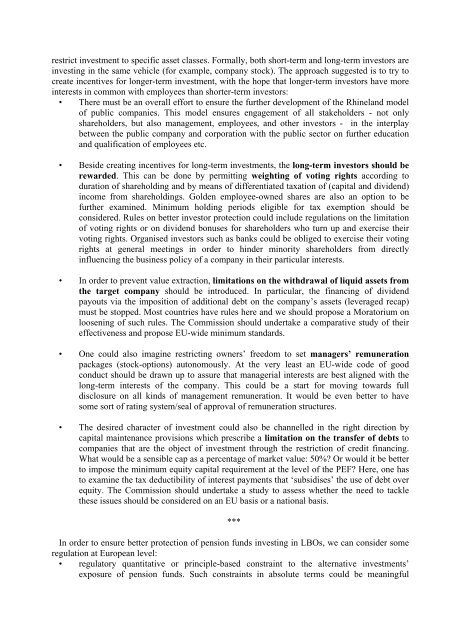Executive summary - Udo Bullmann
Executive summary - Udo Bullmann
Executive summary - Udo Bullmann
- No tags were found...
Create successful ePaper yourself
Turn your PDF publications into a flip-book with our unique Google optimized e-Paper software.
estrict investment to specific asset classes. Formally, both short-term and long-term investors areinvesting in the same vehicle (for example, company stock). The approach suggested is to try tocreate incentives for longer-term investment, with the hope that longer-term investors have moreinterests in common with employees than shorter-term investors:• There must be an overall effort to ensure the further development of the Rhineland modelof public companies. This model ensures engagement of all stakeholders - not onlyshareholders, but also management, employees, and other investors - in the interplaybetween the public company and corporation with the public sector on further educationand qualification of employees etc.• Beside creating incentives for long-term investments, the long-term investors should berewarded. This can be done by permitting weighting of voting rights according toduration of shareholding and by means of differentiated taxation of (capital and dividend)income from shareholdings. Golden employee-owned shares are also an option to befurther examined. Minimum holding periods eligible for tax exemption should beconsidered. Rules on better investor protection could include regulations on the limitationof voting rights or on dividend bonuses for shareholders who turn up and exercise theirvoting rights. Organised investors such as banks could be obliged to exercise their votingrights at general meetings in order to hinder minority shareholders from directlyinfluencing the business policy of a company in their particular interests.• In order to prevent value extraction, limitations on the withdrawal of liquid assets fromthe target company should be introduced. In particular, the financing of dividendpayouts via the imposition of additional debt on the company’s assets (leveraged recap)must be stopped. Most countries have rules here and we should propose a Moratorium onloosening of such rules. The Commission should undertake a comparative study of theireffectiveness and propose EU-wide minimum standards.• One could also imagine restricting owners’ freedom to set managers’ remunerationpackages (stock-options) autonomously. At the very least an EU-wide code of goodconduct should be drawn up to assure that managerial interests are best aligned with thelong-term interests of the company. This could be a start for moving towards fulldisclosure on all kinds of management remuneration. It would be even better to havesome sort of rating system/seal of approval of remuneration structures.• The desired character of investment could also be channelled in the right direction bycapital maintenance provisions which prescribe a limitation on the transfer of debts tocompanies that are the object of investment through the restriction of credit financing.What would be a sensible cap as a percentage of market value: 50%? Or would it be betterto impose the minimum equity capital requirement at the level of the PEF? Here, one hasto examine the tax deductibility of interest payments that ‘subsidises’ the use of debt overequity. The Commission should undertake a study to assess whether the need to tacklethese issues should be considered on an EU basis or a national basis.***In order to ensure better protection of pension funds investing in LBOs, we can consider someregulation at European level:• regulatory quantitative or principle-based constraint to the alternative investments’exposure of pension funds. Such constraints in absolute terms could be meaningful





